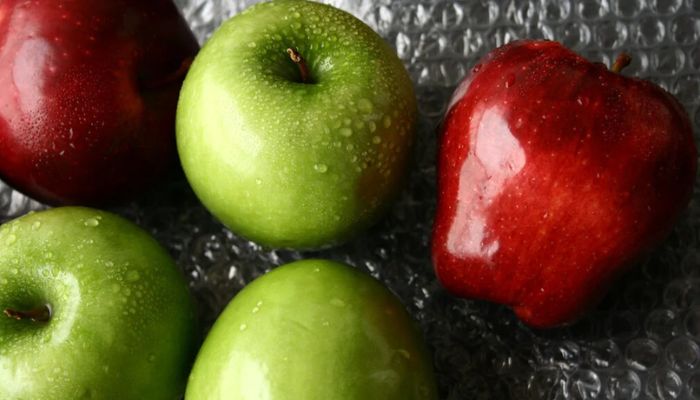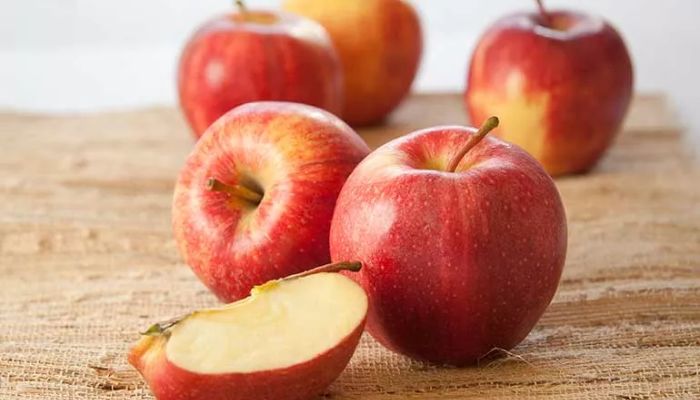Since I’ve been a nutritionist for more than seven years, people often ask me what fruits are good for me. When I talk to my clients, the apple is one fruit that comes up a lot. There are a lot of good things for your health in this popular fruit. It’s full of vitamins, minerals, and antioxidants.
This article will tell you about the health benefits of apples and why you should eat them every day. I’ll also tell you how to make more apples a part of your meals and snacks.
Calorie and Macronutrient Content
A medium-sized apple has about 95 calories, so it’s a good snack for people who are trying to lose weight. On top of that, apples don’t have any fat, cholesterol, or sodium.
About the following is in one serving of apples:
- Twenty-five grams of sugar
- 4 grams of fiber
- 14 grams of sugar and 195 mg of potassium
The majority of the calories in an apple come from carbs. Apples have simple sugars like glucose and fructose that give you energy quickly. They also have fiber, which makes you feel full and slows down digestion.
Apples are very filling because they have a lot of fiber and water. Studies have shown that eating an apple before a meal can help you lose weight over time by lowering the number of calories you eat.
Vitamins and Minerals
Apples are full of minerals and vitamins that your body needs, like copper, potassium, vitamin K, and vitamin C. Among the many healthy things you can find in a medium-sized apple are the following:
- 9 8 mg of vitamin C. Vitamin C helps the body’s immune system and fights free radicals.
- 195 mg of potassium. Potassium helps keep the heart healthy, keep fluids in balance, and keep muscles working.
- 5.7 mcg of vitamin K. This vitamin helps your blood clot and keeps your bones healthy.
- 0.12 mg of copper. Copper helps the body absorb iron and is used to make energy.
Apples also have small amounts of calcium, magnesium, phosphorus, and B-complex vitamins.
Powerful Antioxidants
Apples have antioxidants like quercetin, catechin, phloridzin, and chlorogenic acid, as well as vitamins and minerals. There are molecules that are unstable and can damage cells. These compounds protect cells from this damage.
Researchers have found that the antioxidants in apples may help reduce swelling, fight cancer, protect the heart, and make it easier to control blood sugar. Leaving the apple’s skin on gives it the most health benefits because it contains most of the fruit’s antioxidants.
Other Good Things About Apples
Apples have been linked to a number of other health benefits. Here are some of the best benefits of this tasty fruit that have been proven to work:
- Improve gut health: Apples have prebiotic fiber that feeds the good bacteria in your gut. Apples may help the good bacteria Bifidobacteria and Lactobacilli grow, according to studies.
- Cut down on cholesterol. Apples have chemicals in them that stop the gut from absorbing cholesterol. In one study, people who ate two apples every day for two months had 40% less LDL cholesterol.
- Keep blood sugar in check: The glycemic index of apples is low, which means they don’t make blood sugar rise quickly. Several studies on humans have shown that apples are good for blood sugar levels and insulin sensitivity.
- Keep your brain healthy: Studies on animals show that the antioxidants in apple juice may protect neurons from neurotoxicity caused by oxidative stress. This could slow down the aging process.
- Boost your immune system: Several studies have found a link between eating apples and a lower risk of getting cancers like breast, colon, and mouth. Apples probably play a part because they have compounds that fight free radicals and inflammation.
Apples have a huge number of health benefits and nutrients, as you can see. That’s why I think they should be a part of a healthy diet.
Incorporating More Apples Into Your Diet
Apples should be eaten at least once a day. Each person gets one medium apple. The following are easy ways to eat more apples:
- As a snack, eat apple slices with almond or peanut butter.
- Take apples, spinach, walnuts, and a light vinaigrette and put them in a salad.
- Toast some nuts, cinnamon, or granola and sprinkle it on top of baked apples.
- Apple dices can be added to oatmeal or overnight oats.
- Put Greek yogurt and sliced apples in a bowl and make an apple pie parfait.
- Put cinnamon on top of apples that have been cooked in coconut oil.
- Add apples, spinach, avocado, and almond milk to a blender and blend until smooth.
- Thinly slice apples and bake them at a low temperature for one to two hours to make apple chips.
A lot of different foods go well with apples, both sweet and savory. They taste great in smoothies, baked goods, yogurt parfaits, and salads.
Keep the skin on to get even more nutrition. Just make sure you wash apples well before you eat them. To avoid getting too many pesticides from regular apples, I suggest buying organic ones whenever you can.
The Takeaway
As a nutritionist, I really think you should eat apples every day. They are low in calories, high in fiber, and full of vitamins, minerals, and antioxidants that fight disease.
Apples may help you lose weight, keep your blood sugar levels in check, improve the health of your gut and heart, and even help your brain work better.
What’s not to love about this sweet, crunchy, and tasty fruit that might be good for you? You can get a lot of great nutrients from apples by including them in your meals and snacks. It’s good for you.
I hope this gives you a good idea of all the great health and nutrition benefits of apples. Please let me know if you need anything else!

Pooja Bohra is a certified nutritionist with over 8 years of experience in the field. At UnderCalories.com, she specializes in creating personalized dietary plans and promoting sustainable health practices, grounded in evidence-based research. Pooja is dedicated to helping individuals achieve their wellness goals. Follow her on Instagram for the latest tips and insights on balanced nutrition and healthy living.

